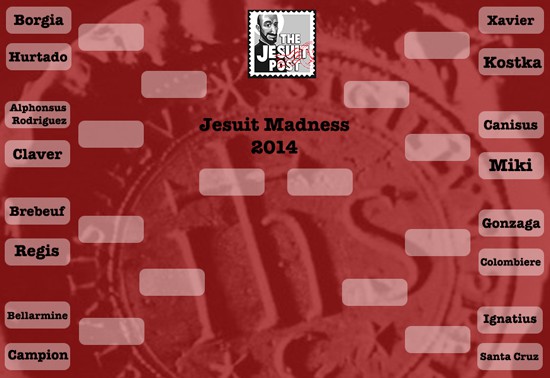Check out the complete #JesuitMadness Bracket.
Follow us via @TheJesuitPost for updates and news.
| St. Francis Borgia, SJ (1510—1572)Some people wish they had all the skills needed for the game; Borgia is not one of them. At the young age of eighteen this saint jumped onto the court ready to impress—that is, the imperial court of Spain. He impressed local and far away Church scouts both on and off the court with his ability to father eight kids and still never miss a practice. But after his wife, Eleanor de Castro, died, he got the call from upstairs and laced up for the second half. He entered religious life with the Jesuits and quickly went from novice to MVP in a few short years.Why Francis wins The first three reasons: Pope Alexander VI, King Ferdinand of Aragon, and Emperor Charles V—yup, Borgia was related to all of them. This saint brings with him a center and two guards that together form the dream team for missionary work unparalleled by any other religious order at that time. Another reason why Francis wins is the fact that he brings discipline to the game. He was able to build religious players (Jesuits) with such execution that it’s no accident that under his guidance he helped establish the New World in Florida, Mexico, and Peru. Francis is known to have told his players frequently, “That being naked of earthly things, we may also embrace the cross.” Borgia takes care of business. | St. Alberto Hurtado (1901-1952)St. Alberto Hurtado is a Chilean Jesuit who is best known for his work with the poor in Santiago. He founded the hugely popular, El Hogar de Cristo which “welcomes the poorest of the poor to help them expand their opportunities for a better life.” He also oversaw the foundation of the widely distributed Spanish periodical Mensaje, which addresses many of the social, religious, and faith issues in Latin America. Hurtado was canonized by Pope Benedict XVI in 2005. Hurtado should be seriously considered as a contender primarily due to his fierce commitment to social justice, before it was “a cool thing.” He struggled for workers’ rights and the development of the Chilean Trade Union Association. He deserves a slot in the final four. You better believe it. |


